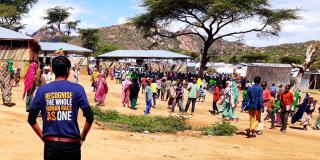
Kamal Jaga, 40, from the UK, volunteered for VSO’s Psychosocial Support Project in Ethiopia, a country devastated by internal conflict that created an estimated 2.2 million internally displaced people. Children and teachers alike are left dealing with trauma, fear, and hopelessness due to their experiences, and the schools hosting displaced children face many challenges in helping them cope.
VSO Ethiopia has been working in partnership with UNICEF to strengthen the inherent resilience and wellbeing of primary school children and teachers affected by internal conflicts. Kamal helped the project train 2,272 teacher educators in psychosocial support and social and emotional learning – knowledge and skills that can be shared and passed on to other teachers to reach as many children in need as possible.
About me
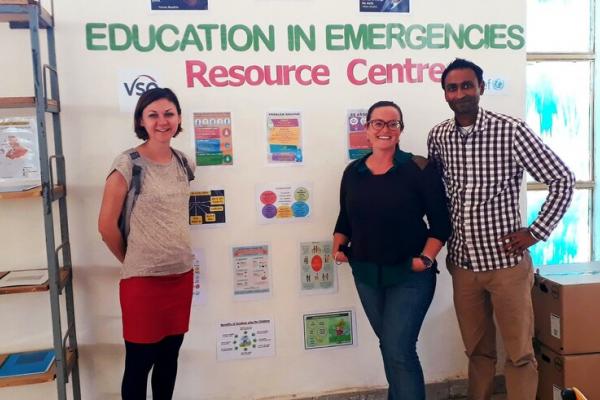
"My family are from India and immigrated to the UK in the 1960s. I’ve been working as a geography teacher in a school in Ascot, near Windsor for the past three years. Both my undergraduate degree and Master’s degree are in geography – learning about the world and how people live – and one of the modules that I was looking at was related to international development. NGOs often do research at universities, and that’s when I came across VSO."
Working in fragile contexts
"Before joining VSO, I had worked in Nepal, South Africa, Peru, and India. My volunteering journey with VSO in Ethiopia started in 2018, when I joined as a Psychosocial Support Advisor, supporting primary school children affected by conflict and displacement. We worked in four different regions across the country – Southern Nations, Nationalities and Peoples' Region; Oromia; Somalia; and Benishangul-Gumuz.
"We mainly focused on Oromia and parts of the Somali Region, because they were the most affected by the conflicts in the country and we could reach the largest number of displaced people. It was a long-term trickle-down idea – we would train the teacher trainers, and they could pass those skills to other teachers, and on to the children in the internally displaced people (IDP) camps.
Every single time I've volunteered, I genuinely felt every single day that I was actually making a difference. It's been my happiest time.
"The support the children needed depended largely on each school that we interviewed, but the two major things were the lack of basic needs – food and water – and the emotional side – the trauma they had gone through.
"We used different techniques to find this out. One psychologist used body mapping with the younger kids; we would draw a picture of a body, and they would talk about their feelings and emotions and different motions for healing. It allowed us to ask children questions in a safe and relaxed manner and the children could tell us about their problems and how they were feeling, how we could help them, and what they needed.
"We also created an education centre – a resource library that VSO and UNICEF supplied with literature materials, resources that they could use. We had these translated from English into each of the local languages, which cost a little extra, but was definitely worth the investment as these materials are there for life."
Building trust and working together
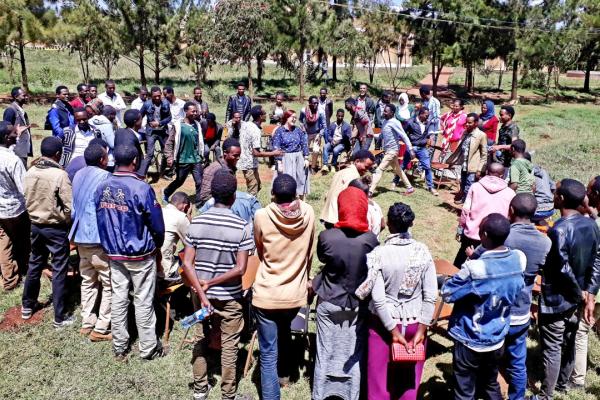
"National volunteers played a crucial role in our programme. We wouldn’t have been as successful without them due to the language barriers and the lack of local knowledge. And it worked both ways – our local counterparts were keen to take our message on board, and while we could share our specialist knowledge, we learned just as much from them.
"The teacher trainers and communities themselves were also very helpful, sharing coping mechanisms for their trauma, such as teacher wellbeing, the benefits of outdoor play, child protection, and discussion groups.
I feel the placement was vastly important because I believe it changed and opened people’s mindsets. The international, national and local volunteers and communities learned a lot from each other.
"While the placement wasn’t without its challenges, we had a strong team bond where we could lean on each other, solve problems, and work together. The biggest challenge was knowing how much the teacher trainers were taking on board. There can also initially be a bit of mistrust, but once the local volunteers understood how the training could help people and they started to trust the international volunteers, and they were much more involved.
"One teacher trainer called Abdihakim felt quite emotional about his initial attitude towards us when we first arrived. But after a few days of training and meeting the community, it seemed that there was a moment when he had a mindset change and started to believe in the project’s impact. Abdihakim has now gone on to do more work in the development world and we still stay in touch.
"I feel the placement was vastly important because I believe it changed and opened people’s mindsets. The international, national and local volunteers and communities learned a lot from each other.
VSO brings about a lasting change in people’s attitudes. As the mindset alters, you see how things can change long-term, even in the most remote environment. There are many great memories: the friendships, meeting locals, the culture. But probably, the biggest highlight of all is looking at the reports and the studies when we went back to the schools and seeing the progress.
Why volunteer with VSO
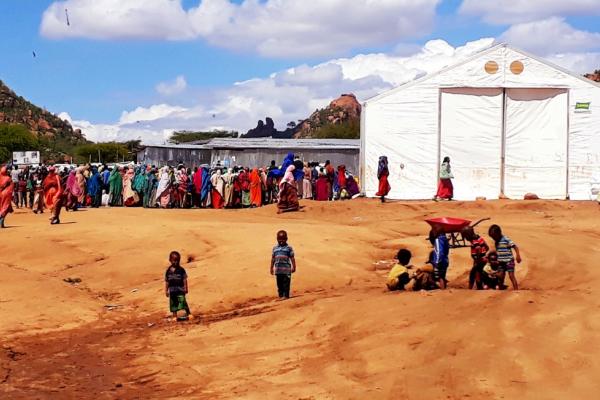
"For anyone considering this experience, know that volunteering is a win; whatever you do, the skills you learn will open more doors for you. Coming back from this project and going back into teaching, my experience with VSO was one of the things the headteacher mentioned that made me stand out from other candidates. Some people may be apprehensive about taking a break from their careers, but volunteering enhances your career rather than holds you back. And for the more senior volunteer – if you’re fit and healthy enough, go for it!
"From studying geography, you learn about the world all the time. How people live and interact, how struggles are different for billions of people. And particularly doing all these projects, you have more knowledge of the world.
"Every single time I've volunteered, I genuinely felt every single day that I was actually making a difference. It's been my happiest time. You have to volunteer when you get a chance."
Volunteer with us
Inspired by Kamal's story? Explore our latest volunteering opportunities to find out how you can use your skills to make a lasting change through volunteering.
Read more
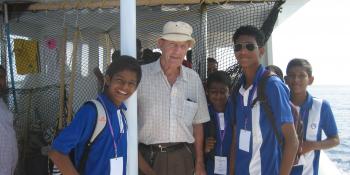
Transforming lives through education: Geoffrey’s VSO legacy
With a deep belief in the transformative power of education, Geoffrey from Norfolk, UK, has devoted his life both in the UK and abroad to making education more accessible for all.
